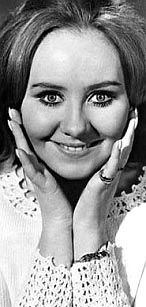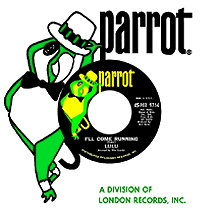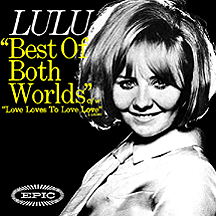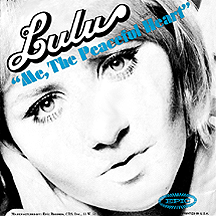LULU
There are so many "Lulus" I can't keep track of them all. Like the 1918 silent film Lulu starring Bela Lugosi and several other films with the same title that have come out since. Then there's Little Lulu, created by comic artist Marge in 1935, whose adventures ran in newspapers, magazines and comic books for decades. And Alban Berg's Lulu opera of the 1930s, Lulu Island near Vancouver, British Columbia, a Chinese actress named Lulu, and...well, you can see what I'm getting at. That brings me to Marie Lawrie of Glasgow, Scotland, a singing ball of fire who, at age 15, became perhaps the best-known Lulu of the bunch.
Growing up the daughter of a butcher in a poor Glasgow neighborhood, Marie was obsessed with music, particularly American R&B artists like Ray Charles, Dinah Washington and Brook Benton. She caused quite a stir with her singing during junior high (Onslow Drive Junior School, in this case) and caught the attention of London promoter Marion Massey, whose brother owned a Glasgow discotheque where she had performed with six-member backing group The Gleneagles. When Massey heard Marie sing, she called her "a lulu of a kid" (or so the story's been handed down) and the name stuck. In 1964, 15-year-old Marie scored a contract with Decca Records and the band's name was changed to The Luvvers (spelled Luvers on U.S. releases) to go along with her new moniker, Lulu. With a mature voice beyond her years, she belted a wall-shaking version of The Isley Brothers' "Shout" and it hit the British top ten in June 1964 (also making a brief showing on the U.S. charts in August on the Parrot label). It remains the song she's best known for in the United Kingdom.
Bronx-born songwriter-producer Bert Berns got in the act for her next release. Impressed by the teen's vocal gymnastics on "Shout," he traveled from New York to London to produce Lulu's next single, a song he'd written (under the name Bert Russel), "Here Comes the Night," but the fall 1964 release barely made the charts (in America it was completely ignored as radio programmers preferred the flip, Berns' "I'll Come Running"). "Night" was much bigger in both England and America when Belfast, Ireland band Them recorded it several months later. In early '65, Decca brass decided she had potential as a solo act and gave the Luvers their walking papers. "Leave a Little Love," produced by Peter Sullivan (as "Shout" had been) and written by Les Reed and Robin Conrad, returned her to Britain's top ten that summer.
The potential Decca saw in her seemed short-sighted when 1966 came and went with no hits. Britain's Columbia label showed some interest, though, and in '67 she started anew with producer Mickie Most. The two clashed almost immediately; Lulu wanted to make R&B-style records but Most had other ideas. His track record over the previous couple of years was impressive, with extended hit streaks for The Animals and Herman's Hermits, and big success in '66 with Donovan, starting with "Sunshine Superman." He was ready to work his magic with Lulu. In later interviews she has said he didn't treat her well or guide her in a positive way. But for the time being he had control.
Breaks began coming her way: at the the start of 1967 she had an opportunity to play a small part in the U.S.-produced To Sir, With Love, starring Sidney Poitier and filmed in London. In addition, she performed the movie's title song written by Don Black and Mark London (Massey's husband). Meanwhile back in the States, Neil Diamond's career had been going pretty well with the 1966 hits "Solitary Man," "Cherry, Cherry" and others after signing with Bert Berns' Bang Records. As a songwriter he'd made an impact with The Monkees' chart-topper "I'm a Believer," one of the biggest hits of all time. Lulu's first single with Most was a Diamond tune, "The Boat That I Row," a top ten U.K. hit in May '67.
Columbia quietly slipped "To Sir, With Love" onto the flip side of Lulu's summer hit "Let's Pretend." Mickie Most didn't like it and the backward-thinking record label bosses obviously didn't consider the potential commercial benefits of tying it into the film's release. It was a different story in America, though, where Lulu still hadn't broken through with a major hit. That status went into serious revision when "To Sir" (released on the Epic label) settled in for a long run at number one in October and November '67. Finally established stateside three years after "Shout," she started 1968 with the orchestrally complex and soulfully delivered "Best of Both Worlds" (also written by Black and London), followed by the less successful but enjoyable Tony Hazzard-penned ditty "Me, the Peaceful Heart."
Having appeared since 1964 on many music variety shows in the U.K. (and a few in the U.S.), Lulu became a regular on the short-lived Three of a Kind in 1967 and hosted a similar show for the BBC the following year, Lulu's Back in Town. A March '68 U.S. tour with the Monkees was sandwiched in between, which led to a little fling with Davy Jones, though she insisted the relationship was quite innocent and proper. Hit singles were harder to come by in 1968, with summertime gem "Morning Dew" the one standout. Written by folk-rockers Tim Rose and Bonnie Dobson with an arrangement, as were several around that time, by John Paul Jones (just weeks before he joined Led Zeppelin) and Peter Knight, it was the last of her singles under Most's watch to hit the charts in America. Her U.S. and U.K. hits didn't align most of the time, so the songs we remember here in the States, with one or two exceptions, differ from what British fans were hearing on the radio; still, she was quite successful in both countries between 1967 and 1969.
Lulu started out '69 engaged to Maurice Gibb of The Bee Gees; the two were married on February 18, weeks before the 14th annual Eurovision contest was held in Spain (featuring Salvador Dali's contribution of a gigantic spiked metal sculpture in the middle of the stage!) Her recording of the Alan Moorhouse-Peter Warne song "Boom Bang-A-Bang" was chosen as the United Kingdom's entry, in Lulu's eyes nothing more than another trite slice of Mickie Most pop. Big surprise, then, when she performed the song at the March event and it won first place in a four-way tie with entries from France, the Netherlands and Spain (resulting in some changes in the rules to guarantee one winner per year in the future). Within a couple of months the song reached number two on England's music charts, her biggest hit there up to that time.

Despite the unexpected Eurovision victory, Lulu's tolerance of Most and his dicey (but popular) song choices was wearing thin. The Yardbirds, another of Most's late-'60s pet projects, weren't crazy about the producer's pop-centric demands either and broke up partly as a result. While mindful of the success that had come from her association with Most, Lulu was ready to take her own road and left Columbia in late 1969 for Atlantic's Atco label, similar to a move Dusty Springfield had made about a year before. She seized the opportunity to sing in the R&B style she'd always preferred; the Jimmy Doris song "Oh Me Oh My (I'm a Fool For You Baby)," produced by Jerry Wexler, Tom Dowd and Arif Mardin, was recorded in Alabama at the Muscle Shoals Sound Studio, which had just been set up by local musicians as an alternative to Rick Hall's FAME facilities. The song landed her back to the top 40 in early 1970. A session with the same team at Miami's Criteria Studios later in the year also drew from R&B influences and included "Hum a Song (From Your Heart)," featuring top-notch studio band The Dixie Flyers.
Her marriage ended in 1973, mainly because of Maurice's escalating alcohol abuse. A 1974 track produced by David Bowie, "The Man Who Sold the World," landed her in Britain's top ten for the first time in five years. Later that same year she added the James Bond movie franchise to her resumé with its latest title theme, "The Man With the Golden Gun," written by original Bond music maestro John Barry and one of her chart-topping "To Sir" suppliers, Don Black. In 1981, "I Could Never Miss You (More Than I Do)" put Lulu back into the upper reaches of the American charts. She focused on musical stage productions in the early '80s (the Royal National Theatre production of Guys and Dolls causing the biggest sensation) and has been alternating, and mixing together, her singing and acting careers ever since.
NOTABLE SINGLES:
- Shout - 1964
as Lulu and the Luvers - I'll Come Running /
Here Comes the Night - 1964 - Leave a Little Love - 1965
- Try to Understand - 1965
- The Boat That I Row /
To Sir With Love - 1967 - Let's Pretend - 1968
- Best of Both Worlds /
Love Loves to Love Love - 1968 - Me, the Peaceful Heart - 1968
- Boy - 1968
- Morning Dew - 1968
- I'm a Tiger - 1968
- Boom Bang-A-Bang - 1969
- Oh Me Oh My (I'm a Fool For You Baby) - 1970
- Hum a Song (From Your Heart) - 1970
with the Dixie Flyers - The Man Who Sold the World - 1974
- The Man With the Golden Gun - 1974
- I Could Never Miss You (More Than I Do) - 1981




